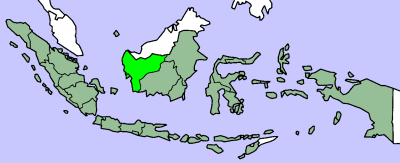West Kalimantan
|
|
West Kalimantan (Indonesian: Kalimantan Barat) is one of the provinces of Indonesia. It is one of four Indonesian provinces in Kalimantan, the Indonesian part of the island of Borneo. Its capital city Pontianak is located right on the Equator line. The province is estimated to be populated by about 4.2 million peoples of Dayak, Malay, Chinese as the three main ethnic groups which make up about 90% of the total population, as well as Javanese, Bugis, Madurese, and other ethnicities.
West Kalimantan is further divided into two municipalities and ten rural regencies. The urban municipalities are Pontianak and Singkawang. The regencies are Sambas, Bengkayang, Pontianak, Ketapang, Landak, Sanggau, Sekadau, Sintang, Melawi and Kapuas Hulu.
History
West Kalimantan was the site of substantial fighting during the Indonesia-Malaysia confrontation under the Sukarno government in the mid-1960s. After Suharto deposed Sukarno in 1965, the confrontation was quickly resolved. Domestic conflict continued, however, for another ten years between the new military Suharto government and fighters organized during the confrontation and backed by the banned Indonesian Communist Party (PKI). There was direct conflict between rebel fighters and the military occurred in the northern part of the region. In addition, however, the military organized local militias among the indigenous Dayak population to attack the substantial rural ethnic Chinese population, which the government assumed were communist supporters. Two to three thousand Chinese people were killed in 1967 and 1968, and between sixty and seventy-five thousand fled the interior for the coast. By 1969 and 1970, the national government's campaign against the rebels began to be more effective, as the Malaysian and Indonesian governments collaborated to find rebel fighters. In October 1973 a parallel rebellion in Sarawak was disbanded, further weakening the Indonesian rebels' position. The conflict finally ended in January 1974 with the capture and execution of Said Achmad Sofyan, the primary rebel leader.
The transmigration program that moved families from Java and Madura to Kalimantan also began, slowly, in the late 1960s, often moving people to regions emptied by the fleeing Chinese populations. The newcomers initially benefitted the national government by providing a relatively loyal population in a troubled area, but laid the groundwork for repeated violence between Madurese transmigrants and indigenous Dayaks in the 1980s and 1990s.
Fruits
Langsat Lansium domesticum Corr.
"Langsat Punggur" is a famous fruit from Punggur, a 15 km small village from Pontianak, accessible by car since 1997. It tastes sweet and watery. Once comes the harvesting, most are marketed to Pontianak,and whole city in west kalimantan provinve; and some to jakarta, Kuching, Malaysia.
It is believed that langsat originally comes from Lampung, Sumatera. The langsat from Bengkulu was marketed in Batavia (Jakarta in the Dutch colonialization era). A merchant from Punggur who often visited Batavia for business purposes, brought the seed of langsat to Punggur and planted them. They grew well and produce a soon favourite fruit in this small village. All the langsat plants now are originally from those seeds from Batavia.
For description about langsat, visit http://www.hort.purdue.edu/newcrop/morton/langsat.html.
Reference
- Davidson, Jamie S. and Douglas Kammen (2002). Indonesia's unknown war and the lineages of violence in West Kalimantan. Indonesia 73:53.

